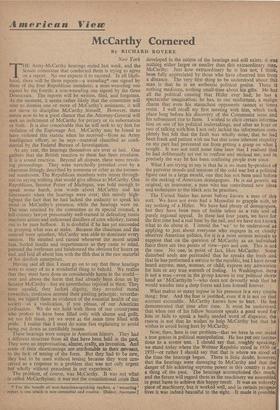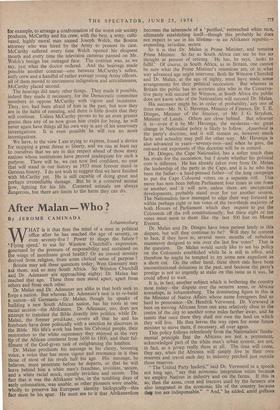McCarthy Cornered
By RICHARD ROVERE . New York At any rate, the hearings themselves are over at last. One gathers that the British reaction to them has been revulsion. It is a sound reaction. Beyond all dispute, these were revolt- ing proceedings. They were wretchedly presided over by a chairman fittingly described by someone or other as the tormen- ted mushroom. The Republican members were intent through- out on saying nothing that would give offence to McCarthy. One Republican, Senator Potter of Michigan, was bold enough to speak some harsh, true words about McCarthy and his lieutenants when the hearings were over; this merely high- lighted the fact that he had lacked the audacity to speak his mind in McCarthy's presence, while the hearings were on. The man retained by the committee as its special counsel, a hill-country lawyer presumably well-trained in defending rustle mayhem artists and unlicensed distillers of corn whiskey, turned out to be pure buffoon. It is doubtful if he has yet succeeded in grasping what was at stake. Because the chairman and the counsel were spineless,' McCarthy was able to dominate every session. He strutted and ranted whenever the mood seized him, hurled insults and impertinences as they came to mind, pursued the irrelevant and belaboured the obvious for hours on end, and laid all about him with the filth that is the raw material of his devilish enterprises.
Having said all this, I must go on to say that these hearings developed in the course of the hearings and still exists; it wad nothing either larger or smaller than this extraordinary man, McCarthy. Just how extraordinary he is has not, I think, been fully appreciated by those who have observed him front a distance. The very first thing to be understood about thiS man is that he is an authentic political genius. There 1$ nothing mediocre, nothing small-time about his gifts. He haS all the political cunning that Hitler ever had; he has a spectacular imagination; he has, to our misfortune, a malign charm that even his staunchest opponents cannot at times resist. I well recall my first meeting with him, which too place long before his discovery of the Communist issue and his subsequent rise to fame. 1 wished to elicit certain informa• tion on one of his political undertakings, and after an hour or two of talking with him I not only lacked the information com- pletely but felt that the fault was wholly mine,' that he had been frank and patient with me but that some inherent stupidity on my part had prevented me from getting a grasp on what I sought. It was not' until some time later that I realised tha he had deliberately set out to confuse and mislead me, and in precisely the way he has been confusing people ever since.
What I am trying to say is that he is no mere by-product of the perverse moods and tensions of the cold war but a political figure cast in a large mould, one that has not been used before in the making of American demagogues. He is sui generic, original, an innovator, a man who has contributed new ideas and techniques to the black arts he practises.
The United States has never before known a man of thie sort. We have not even had a Mussolini to grapple with, to say nothing of a Hitler. We have had plenty of demagogues, but they have been men of feeble talent as a rule and of purely regional appeal. In these last four years, we have fo$ the first time had a real bear by the tail, and we have not knowil what to do about it. I intend the ' we ' to be understood ai applying to just about everyone who engages in or closely observes American politics, for it is a most serious mistake tq suppose that on the question of McCarthy as an individual force there are two points of view—pro and con. This is not the case. No one, in point of fact, likes McCarthy. Some disturbed souls are persuaded that he speaks the truth .and that he has performed a service to the republic, but I have never heard anyone, man, woman, or child, express any admiration for him or any true warmth of feeling. In Washington, there is not a man—even in the group known in our political short. hand as ` McCarthyite '—who does not devoutly wish that he would wander into a deep forest and lose himself forever.
What makes so many supine in his presence is a very simple thing: fear. And the fear is justified, even if it is not on that account excusable. McCarthy knows how to hurt. He has demonstrated that time after time. It must be understood that when one of his fellow Senators speaks a good word fo$ him or fails to speak a badly needed word of dispraise, the reason is not that he wishes to help McCarthy but that he wishes to avoid being hurt by McCarthy..
Now, then, here is our problem—that we have in our midst a true genius in political manipulation. He has put our institu• dons to a severe test. I should say that, roughly speaking, , we stand today where the Weimar Republic stood in 1930 o$ 1931—or rather I should say that that is where we stood at the time the hearings began. There is little doubt, however, that the hearings were damaging to McCarthy and that the danger of his achieving supreme power in this country is now a thing of the past. The hearings accomplished this much, and the future will regard them as the machinery we assembled in great haste to achieve this happy result. It was an unlovely piece of machinery, but it worked well, and in certain perspec' tives it was indeed beausiful to the sight. It made it-possible, for example, to arrange a confrontation of the worst our society produces, McCarthy and his crew, with the best, a witty, culti- Vated, highly moral man named Joseph WelCh, the Boston attorney who was hired by the Army to present its case. McCarthy suffered every time Welch opened his eloquent Mouth and every time the television cameras panned on Mr. Welch's benign but outraged face. The contrast was, as we Say, just what the doctor ordered. And the hearings made possible another contrast—one between McCarthy's sullen, Surly crew and a handful of rather average young Army officers, all of them moved to uncommon indignation and articulateness. McCarthy placed second.
The hearings did many other things. They made it possible, indeed they made it necessary, for the Democratic committee members to oppose McCarthy with vigour and insistence. They, too, had been afraid of him in the past, but now they are in the habit of resisting, and there is little doubt that they will continue. Unless McCarthy proves to be an even greater genius than any of us now gives him credit for being, he will never again have things all his own way in any of his unsavoury investigations. It is even possible he will run no more investigations.
We have, in the view I am trying to express, found a device for stopping a great threat to liberty, and we can at least say to ourselves that we are in this respect ahead of those many nations whose institutions have proved inadequate for such a purpose. There will be, we can now feel confident, no year that will stand in our history as 1933 must forever stand in German history. I do not wish to suggest that we have finished with McCarthy yet. He is still capable of doing great and perhaps irremediable damage. But he is a cornered animal flow, fighting for his life. Cornered animals are always dangerous, but there are limits to the harm they can do.



































 Previous page
Previous page